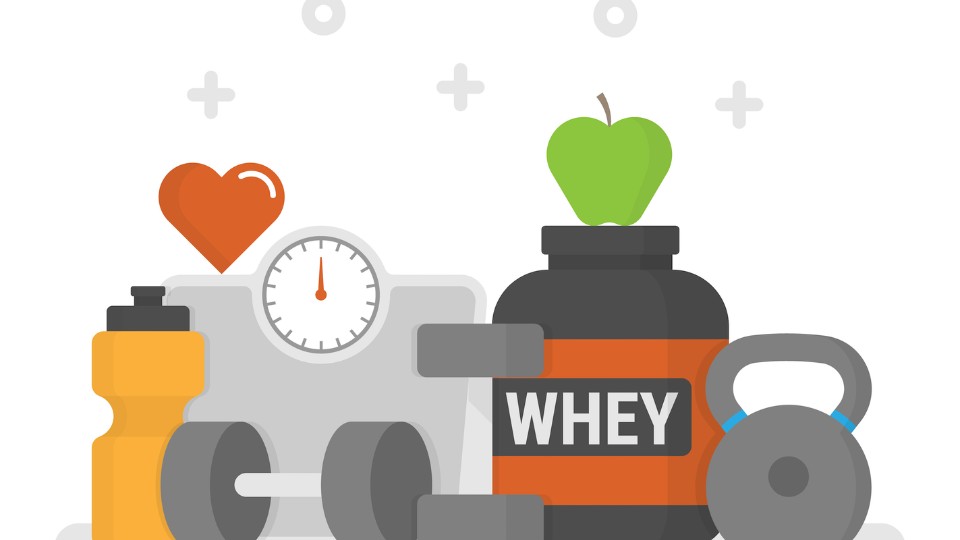
Have you ever been tempted to buy sports supplements in the hope of improving your performance? It wouldn't be surprising. The market is flooded with supplements that promise better training efficiency, rapid muscle gain, or effortless weight loss. Before spending your savings on these products, let's take a look at which ones are truly worth it.
First, before taking any sports supplement, it's important to ask yourself a few questions:
• Is it safe (knowledge of ingredients, place of production, recommended dosage, health effects)?
• Is it legal (prohibited ingredients in sports use in Canada)?
• Is it effective (scientific evidence, usage protocol, recommended dosage)?
Considering all this, there are two main supplements that you can rely on and that will certainly have an impact on your performance while remaining safe.
1. Whey Protein Powder
Whey protein powder is the isolated version of one of the two proteins found in milk (the other being casein). In this form, the protein is well-absorbed by the body and highly available. This supplement can be used to meet daily protein requirements, which are often higher for athletes.
To maximize its effect, it is best to take it around your workouts, aiming for 25-30g of protein per serving. Another advantageous fact: whey protein contains a significant amount of leucine, an amino acid closely involved in muscle synthesis. There is more leucine in a serving of whey protein than in the same serving of soy or casein protein.
2. Creatine
Some may be surprised to learn that creatine is a molecule naturally produced by the body. It is also present in certain foods, primarily meat, eggs, and fish. It helps increase energy and power during workouts, thus maximizing performance. Because it enhances workout efficiency, creatine promotes muscle mass gain.
Some studies also show a noticeable effect of creatine supplementation on reducing fatigue. Creatine monohydrate is the most common form, and a supplementation of 5g/day is recommended. One of the side effects of creatine supplementation is water retention, which is harmless.
In addition to these two supplements, there are others to consider. These are supplements that, in the right context, can provide benefits but are not recommended for everyone.
1. Beta-Alanine
Beta-alanine is a modified version of the amino acid alanine, which acts as an acid buffer in the body (counteracting the effects of lactic acid, for example). Beta-alanine supplementation has shown an increase in muscle endurance, with many reporting being able to do 1-2 additional repetitions during a workout in the 8 to 15 repetition range. This product can also increase the ability to perform moderate to high-intensity cardiovascular efforts (e.g., rowing or sprints) and even reduce fatigue. In terms of side effects, large doses can cause a tingling sensation called paresthesia, which is again harmless.
2. Caffeine
Well-known to many, caffeine can also be used as a supplement, taken through beverages or even tablets. Caffeine has a stimulating effect and is used to increase strength and endurance during physical exertion. There is also an improvement in reaction time and a decrease in perceived effort with caffeine supplementation. However, caffeine intake can lead to tolerance and dependence – frequent users will see the effect diminish. For maximum effectiveness, a dose of 4-6 mg/kg is generally recommended, ensuring not to exceed 400 mg/day.
There are many other supplements favoured by athletes but are unfortunately ineffective or have limited effectiveness. Here are two that, although popular, are not recommended:
1. Branched-Chain Amino Acids (BCAAs)
BCAAs consist of three amino acids: leucine, isoleucine, and valine. These amino acids are undoubtedly important for muscle synthesis, but they are already present in large quantities in foods (such as meat and eggs) and protein supplements (whey protein powder), making supplementation unnecessary for most people. Athletes consuming less than 1g of protein per kg may be the only ones who could truly benefit from taking BCAAs.
2. Glutamine
Glutamine is an amino acid that is only essential for those with inadequate intake (such as vegans, vegetarians, or those consuming little dairy) or during prolonged endurance activities. Glutamine is found in high quantities in animal-based products as well as whey protein and casein powder. The beneficial effects of glutamine on muscle growth are often touted, but these effects are only appreciable in individuals who have experienced significant physical trauma (such as severe burns or wounds) or have a health condition that increases muscle breakdown (e.g., AIDS). Healthy athletes generally do not need a glutamine supplement.
It is possible to find a supplement that suits you and ihleticmproves your at performance. You just need to be vigilant against marketing strategies used to sell these products and ensure they are effective and safe. It would be relevant to consult with your physician and nutritionist before starting any sports supplement. A healthy and balanced diet is often sufficient for successful training!
* Photo credit: https://www.freepik.com/free-photos-vectors/heart">Heart vector





